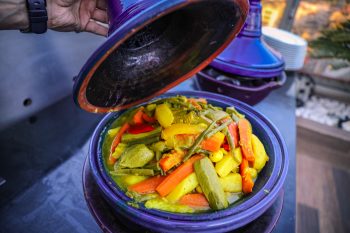Two Arabic proverbs about Food Posted by Hanan Ben Nafa on Jul 27, 2020 in Arabic Language, Culture, Vocabulary
This post focuses on two very popular proverbs مثلين مشهورين جدًا in spoken Arabic. Both are related to the topic of food موضوع الطعام. The intended meaning of both of them is positive إيجابي. While one is a prayer دعوة/أمنية to the “eater”, the other is considered an advice نصيحة. Below, a detailed explanation of each of the proverbs: their literal meaning المعنى الحرفي, the intended meaning المعنى المُراد/المقصود and finally their applicability التطبيق or use الاستخدام .
The first proverb we’re looking at is:
مطرح ما يسري يمري
MaTraH maa yesri yemri
Literal meaning:
Where it goes may it pass/ be swollen easily.
“it” above refers to: food.
Actual meaning:
- May you enjoy the food and have a pleasant eating & digestion experience.
- bon appétit.
Use:
This proverb is mainly used in Egypt but is also used generally in the Arab world, using the Egyptian Arabic pronunciation. The proverb is another way of saying SaHHa w aafya صحّة وعافية , which is said while someone is eating (or after they had eaten) as a way to wish well being and good health. I talked about this phrase in detail in a previous post here.
= = = = = = =
As is the case with many other proverbs in the spoken Arabic, this proverb also exists in other dialects other than Egyptian, such as its equivalent in Levantine Arabic. It goes like:
محل ما يسرى يمري
MaHal maa yesri yemri
The only different is in terms of vocabulary, so rather than “MaTraH”, i.e. place, it’s “MaHal”.
= = = = = = =
*Comment on vocabulary:
The 1st verb used here is: “yesri” or “yasri” (in standard Arabic), which means> to flow or go through. The verb is also associated with ease, as it’s related to the noun “yusr” يُسْرْ, i.e. ease.
The 2nd verb used here is: “yemri”, which means> to pass by smotthly. The verb doesn’t exist in Standard Arabic, however, it’s derived from the noun “maree2” مريء which is the English word for oesophagus. So, the verb “yemri” seems to be creatively used to convey the idea of smooth flow and digestion of food.
= = = = = = =
The second proverb we’re looking at is:
تغدّى وتمدّى وتعشى وتمشى
T-ghadda w tmadda, w t-ʕašša w t-mašša
Literal meaning:
Have lunch and lie down and have dinner and walk
Actual meaning:
Rest after lunch and move after dinner.
Use:
The proverb (in this particular pronunciation) is used in Libya. It’s usually said as a general advice in relation to food. It seems to refer to a difference between lunch and dinner, which can be due to the amount & type of food eaten in each meal: lunch is usually quite fatty دسم while dinner is relatively light خفيف .
Ironically, recent studies الدراسات الحديث now show تشير إلى that it’s not a good idea to sleep after a big meal as it causes problems with digestion الهضم, unlike walking.
= = = = = = =
*Comment on vocabulary:
The 1st verb used that I would like to elaborate on here is: “t-madda” or “tamaddad” (in standard Arabic), which means> to lie down. The verb is closely related to the idea of spreading or stretching in general: امتداد imtidaad.
The 2nd verb here is “t-mašša” which is the second person, imperative tense (in spoken Arabic) to mean “walk”, from walking مَشْيْ.
= = = = = = =
The proverb is obviously used all over the Arab world, in a slightly different way. For example, in Levantine Arabic, this is how it’s said:
اتغدى وتمدد، ولو دقيقتين
T-ghadda w tmaddad, we law d2ee2te:n
(Have lunch and lie down, even for two minutes)
اتعشى وتمشى ولو فشختين
t-ʕašša w t-mašša, we law *fašikhte:n
(Have lunch and lie down, even two steps)
*Faškha= step خُطْوَة
Faškhte:n – two steps خُطْوَتين
= = = = = = =

Build vocabulary, practice pronunciation, and more with Transparent Language Online. Available anytime, anywhere, on any device.





Comments:
Jijii:
I learned the second one from Palestinians as it is used in Libya, not the (likely Lebanese) Levantine versions presented. It’s also used in Jordan. South Levantine varies quite a bit from northern, and often has elements in common with nearby dialects. My Egyptian friends confirm they use the same version but the first proverb more. I have also heard people in the Gulf use the second one, as is.
Hanan Ben Nafa:
@Jijii Yeah, it’s very common to find a great overlap n the use of proverbs across the Arab region.